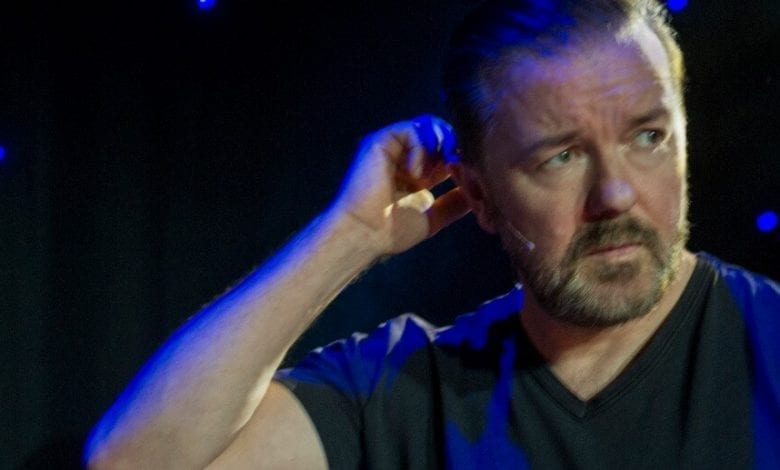Terry Gilliam, Ricky Gervais Befuddle Woke Reporters

Celebrities who crave softball interviews have an easy solution.
Speak out against Climate Change.
Just look what happened when Jane Fonda did just that late last year. The Oscar winner got a crush of positive press. Very few, if any, reporters pressed her about her own carbon footprint, whether her repeated arrests really help and how she travels so frequently from D.C. to where her Netflix series “Grace and Frankie” shoots.
The opposite is true for artists who defy the Thought Police.
Consider this chat with Monty Python alum Terry Gilliam. The director, much like fellow Python player John Cleese, has had enough of political correctness. So when given the chance to talk up his latest movie project he ignored it entirely.
Instead, Gilliam explored a number of hot button topics that left his interviewer scrambling for her safe space.
I can’t say it was a pleasure to interview Terry Gilliam https://t.co/05FNz8sDVW
— Alexandra Pollard (@alexjpollard) January 4, 2020
Why?
Gilliam didn’t succumb to her woke reporter groupthink. In fact, he pushed and prodded her on a number of issues. Was he kidding? Sort of. Maybe. He was being provocative, questioning certain lines of thinking that are considered beyond debate from modern Leftists.
That group intersects dramatically with most reporters. That’s how we get exchanges like this:
It is deeply frustrating to argue with Gilliam. He is both the devil and his advocate. I try to say that it’s not that white men are to blame for everything, but that they are born with certain privileges that, too often, they exploit. He interrupts.
“It’s been so simplified is what I don’t like. When I announce that I’m a black lesbian in transition, people take offence at that. Why?”
Is it the reporter’s job to “argue” with her subject? She can question him, push him on issues, and more. But argue?
Gilliam is giving the outrage police all the material they crave, and then some.
White men: want the privileges of being white men
White men: tired of the responsibility of being white men https://t.co/jfTrQRj0GX— Jeff Yang (@originalspin) January 4, 2020
But to read the entire conversations reveals the caveats, the shades of gray, that make his positions more reasonable.
On a certain level he knows it won’t work that way. And he likely doesn’t care.
“I’m into diversity more than anybody,” he says, “but diversity in the way you think about the world, which means you can hate what I just said. That’s fine! No problem. I mean, you can believe whatever you want to believe, but fundamentalism always ends up being, ‘You have to attack other people who are not like you,’ and that’s what makes me crazy. Life is fantastic, it’s wonderful, it’s so complex. Enjoy it and play with it and have fun.
And then there’s Ricky Gervais. The media spent the last two weeks amplifying his “transphobic” comments, hoping to derail his fifth time hosting the Golden Globes.
It didn’t work.
Why?
In part because Gervais ignores the outrage mob. He also deftly explains himself in ways that tie the Left (and the media) up in knots. Gervais, who triggered liberals with his Netflix special “Humanity,” is more eloquent, and understanding, of his woke reporter than Gilliam. The latter legend probably doesn’t care.
The results, however, are similar.
Question after question pound Gervais, all from a similar playbook.
- Isn’t what you’re doing wrong?
- Why won’t you apologize?
- Isn’t your brand of humor dead and buried?
The whole interview must be read to be fully appreciated.
Consider these highlights:
People like the idea of freedom of speech until they hear something they don’t like. … It’s just another form of what we’ve been through many, many times — it used to be called P.C. I think those things start off with very good intention and then they’re mugged. It’s a good thing to not be racist and sexist and homophobic. But it’s not a good thing to not be allowed to make jokes about those things, because you can tell a joke about race without being racist.
Here, Gervais defends himself and captures the current mood as well as anyone could.
How do you respond when people keep bringing up comments that you’ve made and implying that you are transphobic?
I just say I’m not. And there’s nothing else you can say, you know? Yeah, I’m not. I can justify the jokes, but I get it. Some people, when you deal with contentious issues or taboo subjects, the very mention of them is the sacrilege.
Now, you could argue these reporters pressed their subjects in ways that illuminated both the artist and his views. Fine.
Even better?
Will they start asking stars with whom they agree with similarly tough questions?

